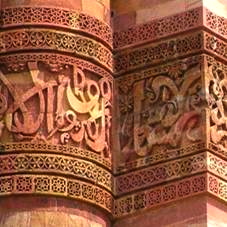 |
|
The political, cross-cultural, and social development of India
from the classical civilizations of late antiquity to the beginning of
British rule in the 18th century. Artistic and architectural
achievements of Indo-Islamic civilization; the Mughal Empire and regional
polities; religious and cultural syncretism; influence of contact
with the West. Emphasis on the historical antecedents of
contemporary debates about South Asia's regional and religious
identities, state formation and fragmentation, and the origins of
colonialism. Counts toward the Asian Studies major and the MENA minor.
Taught: Alternate years, 4 semester credits |
| ----Inscription on the Qutb Minar, Delhi, early 13th century
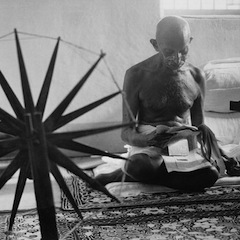 |
|
The social,
economic, and political history of the Indian subcontinent from
the 18th century to the present. The cultural foundations
of Indian society; the East India Company and the expansion of British
power; the experience of Indians under the British Raj; Gandhi and
the rise of Indian nationalism; Independence and Partition; the
postcolonial nations of South Asia. Thematic emphasis on the
causes and consequences of Western imperialism, religious and
cultural identities, and competing historical interpretations.
Counts toward the International Affairs and Asian Studies
majors and the MENA minor.
Taught: Alternate years, 4 semester credits |
| ----Mohandas Gandhi, 1946 © Margaret Bourke-White, Time-Getty
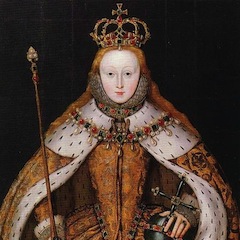 |
|
The
British Isles from the late 15th century to the Glorious
Revolution. The church and state in late medieval Britain; the English
and Scottish Reformations; Elizabeth and her realm; evolution
of monarchical and aristocratic power under the Tudors and Stuarts;
Shakespeare, Milton, and the English literary renaissance; conquest
and settlement in Ireland; Cromwell, the Puritans, and the English
Civil War; life in the villages and the growth of the mercantile
economy; the Glorious Revolution and the shaping of constitutional
monarchy.
Taught: Every third year, 4 semester credits |
| ----Coronation Portrait of Queen Elizabeth I, 1558 (artist unknown) © National Portrait Gallery, London
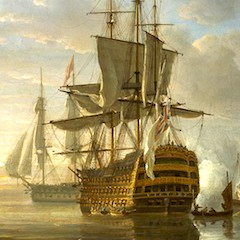 |
|
Britain and its people from the Glorious Revolution to the end
of the Napoleonic War. The evolution of Parliament, party politics, and the
constitutional monarchy; the Augustan Age: arts, letters, and religion;
the Atlantic world and British overseas expansion; the Enlightenment
and Scientific Revolution; the American Revolution and its aftermath;
Union with Scotland and Ireland and the creation of the British
national identity; the revolution in France and the wars against
Napoleon; the beginnings of the Industrial Revolution.
Taught: Every third year, 4 semester credits |
|
----Nicholas Pocock, HMS Victory at anchor, 1807 © National Maritime Museum, Greenwich
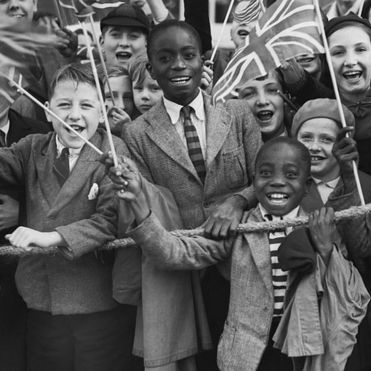 |
|
Britain from the Industrial Revolution to the present. Industrialization
and its social consequences; the shaping of Victorian society; the
rise and fall of the British Empire; the Irish question and the
emancipation of women; political reform and the rise of mass politics;
the age of total war; popular culture, immigration, and
multi-cultural society. Themes include the growth
of the social and economic class structure, the shaping of national
and regional identities, and the consequences of imperialism.
Taught: Every third year, 4 semester credits |
|
----Children in Brixton, South London, waiting to see Queen Mary open Lambeth Town Hall, 1938 © Getty
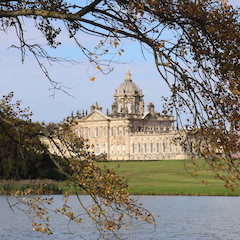 |
|
An interdisciplinary study of Britain throughout the 20th century. Literary study focuses on the Bloomsbury Group, the War Poets, Waugh, Orwell, Emecheta, Marson, Larkin, Rushdie, Ishiguro and Oswald. Historical topics include the two world wars; interwar politics, society and class dynamics; Britons in the Spanish Civil War; building the welfare state; postwar decolonization and immigration; popular culture in the 1960s and 70s; Thatcherism; and multicultural Britain into the 21st century. This course counts towards the English major.
Prerequisite: Sophomore standing; HIST 224 recommended
Taught: Spring 2018 (possibly repeated), 4 semester credits |
|
----Castle Howard, Yorkshire (film location for Evelyn Waugh's Brideshead Revsisted). Photo by David Campion
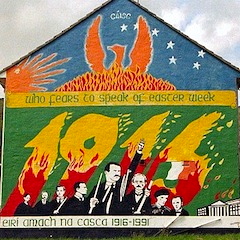 |
|
An interdisciplinary approach to the study of Ireland from the mid-19th
century to the present.
Literary study focuses on the works of Yeats, Joyce, Shaw, Synge,
Kavanagh, and O'Casey along with contemporary authors Heaney and Doyle.
Historical topics include famine and emigration; home rule, republicanism,
and unionism; the war for independence, the Irish Civil War, and the
"Troubles" in Northern Ireland; religion, politics, and civil society in
the Irish Republic. This course counts towards the English major.
Prerequisite: Sophomore standing; HIST 224 recommended
Taught: Spring 2013 (possibly repeated), 4 semester credits |
|
----Easter 1916 Mural, Whiterock Road, Ballymurphy, West Belfast, 1991 © BBC Online
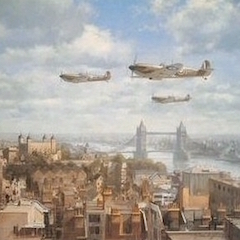 |
|
The history of London over two millennia from its origins as a garrison town at the edge of the Roman Empire, to the political and cultural capital of Medieval England and later Britain, to the heart of the first industrial society and center of the world’s largest empire, through the crucible of two world wars, and finally to its evolution into one of the most complex, vibrant, and diverse cities in the world. Required course for the London Humanities Program. Classes will be supplemented with excursions and site visits.
Prerequisite: Participation in 2018 London Humanities Program
Taught: Fall 2018 (possibly repeated), 4 semester credits |
|
----John Young, Spitfires Over London
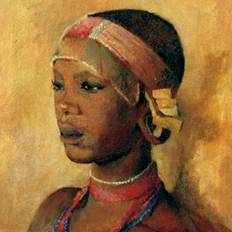 |
|
The colonial and postcolonial development of East Africa from the mid-19th
century to the present. European exploration, missionary activity, and
interaction between indigenous societies and settler populations; formation
of the colonial state and economy; technological and agrarian development
and its consequences; African nationalism, independence, and regional
integration; the postcolonial politics
and economies of Kenya, Tanzania, and Uganda. Required course for the
East Africa Program; taught in Kenya and Tanzania.
Prerequisite: Participation in 2016 East Africa Program
Taught: Fall 2016 (possibly repeated), 4 semester credits |
|
----Baroness Karen Blixen-Finecke, Portrait of a Kikuyu girl, 1924 © Karen Blixen Museum, Nairobi, Kenya
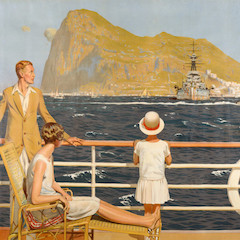 |
|
The history of British overseas expansion from the early 17th
century to the end of the 20th century. Theories of imperialism;
Britain's Atlantic trade network; the Victorian empire in war and
peace; collaboration and resistance among colonized peoples; India
under the British Raj; the Scramble for Africa; the effects
of empire on British culture; the creation of the British Commonwealth;
the rise of nationalism in the colonies; decolonization
and postcolonial perspectives. This course counts toward the IA
major and the MENA minor.
Prerequisite: Junior standing or consent of the instructor
Taught: Alternate years, 4 semester credits |
|
----Gibraltar by Charles Pears, for the Empire Marketing Board, 1930, National Archives of Britain
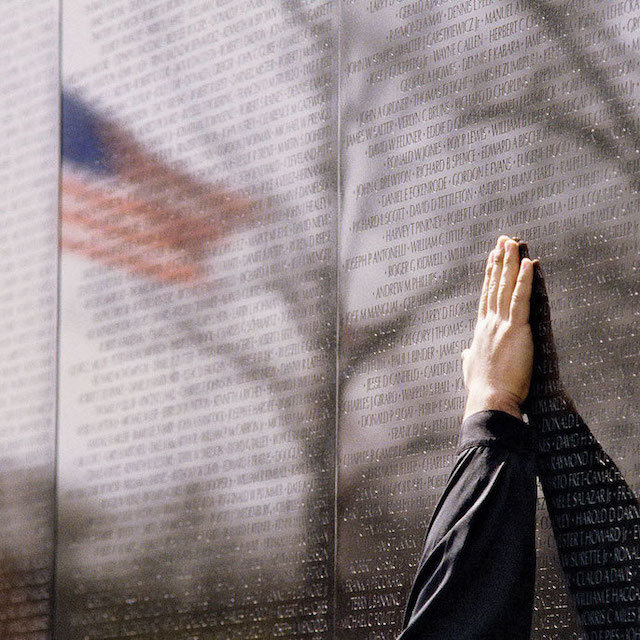 |
|
Military history from antiquity to the present day with an emphasis on American history and the twentieth century. Evolution of strategy, tactics, and technology through focus on specific battles; the development of military leadership through the ages; the interaction between the military establishment and civil society; the professionalization of soldiering; the perspectives of the soldier on the ground; training and indoctrination; reintegration of veterans into civilian society; and ideals of citizenship and military service.
Prerequisite: Junior standing or consent of the instructor
Taught: Fall 2020 (possibly repeated), 4 semester credits |
|
----Vietnam Veterans Memorial, Washington DC
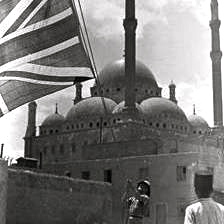 |
|
This reading-intensive
course focuses on the steady dismantling of Europe's overseas empires
during the latter half of the 20th century, primarily in Asia and
Africa. A critical and comparative analysis of such examples
as India/Pakistan, Kenya, Algeria, Vietnam, and Jordan as well as a
focus on postcolonial literature and theory. Readings are drawn
from a wide range of historical scholarship addressing the political,
cultural, social, and economic dimensions of decolonization and its
legacies in our own time.
Prerequisite: Junior standing or consent of the instructor
Taught: Fall 2015 (possibly repeated), 4 semester credits |
|
----Union Jack lowered after the death of King Fuad, Cairo Citadel, 1936 © Getty Images
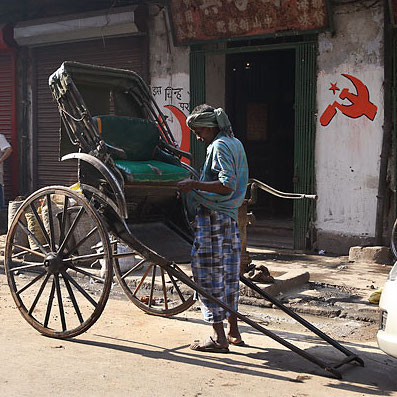 |
|
This reading-intensive colloquium
focuses on the historiography of the Indian subcontinent from the decline of the
Mughal Empire and expansion of the British East India Company through the period
of British crown rule into the early decades of the Republic of India. Readings will
span a wide range of scholarship on the political, cultural, social, economic and
psychological dimensions of colonial and postcolonial Modern India.
Prerequisite: Junior standing or consent of the instructor
Taught: Spring 2021 (possibly repeated), 4 semester credits |
|
----Hands Across the Divide by Maurice Herron, 1991, Carlisle Square, Derry, Northern Ireland
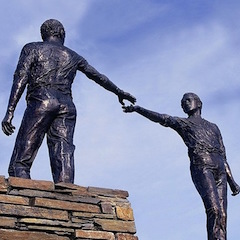 |
|
A comparative
and critical analysis of the political and social development of
Ireland from the late 18th century to the present. The birth of Irish
republicanism; the Catholic
Church and the Protestant Ascendancy; the Famine and the diaspora;
the Irish literary renaissance; Home Rule campaigns and rise
of Ulster Unionism; the Easter Rising and the war for independence;
Northern Ireland's "Troubles"; contemporary politics and society.
Competing interpretations of history and the shaping and reshaping of
Irish identities.
Prerequisite: Junior standing or consent of the instructor
Taught: Fall 2006 (possibly repeated), 4 semester credits |
|
----Hands Across the Divide by Maurice Herron, 1991, Carlisle Square, Derry, Northern Ireland
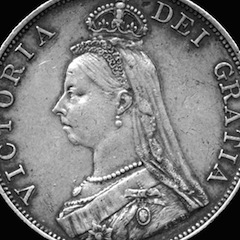 |
|
This seminar focuses on the transformation of Britain and its empire from
the coronation of Queen Victoria in 1837 to her death in 1901. Readings
and discussions provide thematic emphasis on the development of class
society, urbanization, science and technology, crime and punishment, political
and social reform, religious and intellectual
history, imperial expansion, and biographical study of key figures. The
aim of the course is the completion of a major research paper.
Prerequisite: Junior standing or consent of the instructor
Taught: Alternate years, 4 semester credits |
|
----Queen Victoria's Golden Jubilee silver double florin, struck 1887
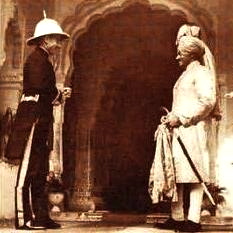 |
|
This seminar traces, chronologically and thematically, the various
and often competing strands of British imperial control over the Indian
subcontinent from the Revolt of 1857 until the independence
of India and Pakistan in 1947. The scope of the readings and discussions
include the ideological, political, technological, social, economic,
psychological and cultural impact of the British in India and Indian
society under colonialism. The aim
of the course is the completion of a major research paper.
Prerequisite: Junior standing or consent of the instructor
Taught: Fall 2003 (possibly repeated), 4 semester credits |
|
----Sir Humphrey Trevelyan, ICS, and Bhawani Singh, Maharaja of Chhatarpur, 1942 © Private Collection of Lady Trevelyan
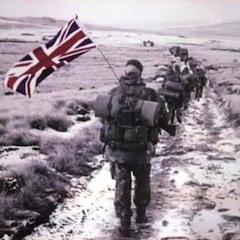 |
|
The focus of this seminar is the transformation of Britain and its empire from the Edwardian era to the beginning of the 21st century. Readings and discussions provide thematic emphasis on the political, social, and cultural history of British society: the impact of the two world wars, the building of the welfare state, cultural and social changes during the interwar and postwar years, and decolonization and the rise of a multicultural society. The aim of the course is the completion of a major research paper.
Prerequisite: Junior standing or consent of the instructor
Taught: Alternate years, 4 semester credits |
|
----Royal Marines march toward Port Stanley, East Falkland, 1982 © Ministry of Defence
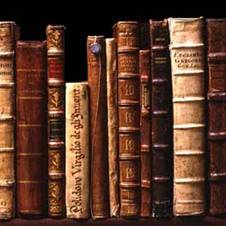 |
|
The materials and craft of historical research. Bibliographic method;
documentary editing and annotating; use of specialized libraries,
manuscripts, government records, oral interviews, photographs, maps and
nautical charts, newspapers and periodicals,
art and architecture, and physical artifacts; career options in history.
Through in-class exercises and individual editing projects students gain
skills in library research,
editing, writing, analysis of sources, and historical judgment.
Prerequisite: Sophomore standing; preference given to history majors
and minors
Taught: Alternate years, 4 semester credits |
|
----Rare books in the Dibner Library of the History of Science and Technology © Smithsonian Institution, Washington DC
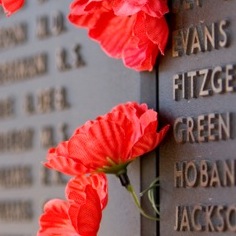 |
|
This section of the first-year core program offers a broad and interdisciplinary focus on the First World War and its legacies in our own time. The origins of the war and the breakdown of the international system; the experience of total war on the front and at home; science, technology and psychology of warfare; moral and philosophical arguments; the impact of the war on literature, art and music; the postwar peace settlement and the aftermath. Emphasis on developing writing and research skills.
Prerequisite: None; this course fulfills the second half of the first-year core program
Taught: Discontinued, 4 semester credits |
|
----Poppies at the Cloisters of the Australian War Memorial, Canberra
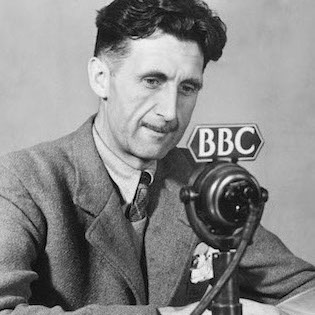 |
|
This section of the first-year core program examines the tumultuous 20th century through the life and writing of Eric Arthur Blair, known to the world as George Orwell. Ever relevant and always honest, Orwell forces us to examine the strength of our convictions and reckon with such enduring concerns as class and poverty, the legacies of imperialism, the dynamics and consequences of ideological conflict, the rise of the surveillance state, and the dangers and attractions of authoritarianism. Emphasis on developing critical reading and writing skills.
Prerequisite: None; this course fulfills the Words seminar of the first-year core program
Taught: Fall 2021, 4 semester credits |
|
----George Orwell during BBC Radio broadcast, January 1940 © BBC |



















